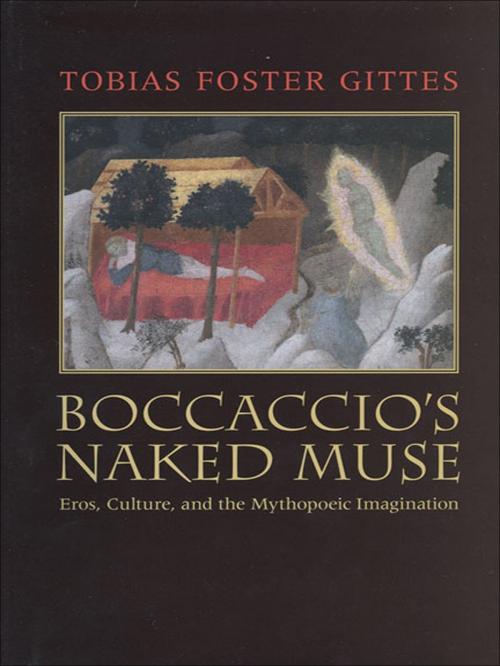Boccaccio's Naked Muse
Eros, Culture, and the Mythopoeic Imagination
Fiction & Literature, Literary Theory & Criticism, European, Italian| Author: | Tobias Foster Gittes | ISBN: | 9781442691438 |
| Publisher: | University of Toronto Press, Scholarly Publishing Division | Publication: | April 5, 2008 |
| Imprint: | Language: | English |
| Author: | Tobias Foster Gittes |
| ISBN: | 9781442691438 |
| Publisher: | University of Toronto Press, Scholarly Publishing Division |
| Publication: | April 5, 2008 |
| Imprint: | |
| Language: | English |
Giovanni Boccaccio (1313-1375) experimented with such a wide variety of genres that critics have tended to focus more on the differences among his works than on their underlying similarities. However, a more comprehensive examination of his corpus reveals that concealed beneath this striking diversity of subject and genre there is a coherent mythology, a virtual catalogue of innovative myths designed to more accurately reflect his cultural experience and better address the needs of his age.
Exploring the most significant of these myths, Boccaccio's Naked Muse presents a writer who cast himself as the apostle of a new humanistic faith, one that would honour God by exalting his creation. Tobias Foster Gittes argues that Boccaccio did not simply reproduce Golden Age schemes in his works. Rather, he subtly altered and adapted them in order to produce a model of human beatitude more suited to his conviction that cultural achievement and human dignity are indissolubly linked. Gittes critiques common conceptions of Boccaccio's passivity, or his readiness to speak dismissively of his own work and to cast himself as a victim of vicious critics. Instead, Gittes shows that Boccaccio deliberately assumed this posture of passivity to align himself with a series of martyrs who, like him, had willingly suffered torments in the interest of cultural advancement.
By venturing outside the Decameron to the Latin works, and outside the usual textual and intertextual readings of Boccaccio to more broadly cultural and anthropological material, Boccaccio's Naked Muse offers fresh insights on this hugely significant literary figure and his lifelong campaign to transform mythological traditions into a gift for all humanity.
Giovanni Boccaccio (1313-1375) experimented with such a wide variety of genres that critics have tended to focus more on the differences among his works than on their underlying similarities. However, a more comprehensive examination of his corpus reveals that concealed beneath this striking diversity of subject and genre there is a coherent mythology, a virtual catalogue of innovative myths designed to more accurately reflect his cultural experience and better address the needs of his age.
Exploring the most significant of these myths, Boccaccio's Naked Muse presents a writer who cast himself as the apostle of a new humanistic faith, one that would honour God by exalting his creation. Tobias Foster Gittes argues that Boccaccio did not simply reproduce Golden Age schemes in his works. Rather, he subtly altered and adapted them in order to produce a model of human beatitude more suited to his conviction that cultural achievement and human dignity are indissolubly linked. Gittes critiques common conceptions of Boccaccio's passivity, or his readiness to speak dismissively of his own work and to cast himself as a victim of vicious critics. Instead, Gittes shows that Boccaccio deliberately assumed this posture of passivity to align himself with a series of martyrs who, like him, had willingly suffered torments in the interest of cultural advancement.
By venturing outside the Decameron to the Latin works, and outside the usual textual and intertextual readings of Boccaccio to more broadly cultural and anthropological material, Boccaccio's Naked Muse offers fresh insights on this hugely significant literary figure and his lifelong campaign to transform mythological traditions into a gift for all humanity.















